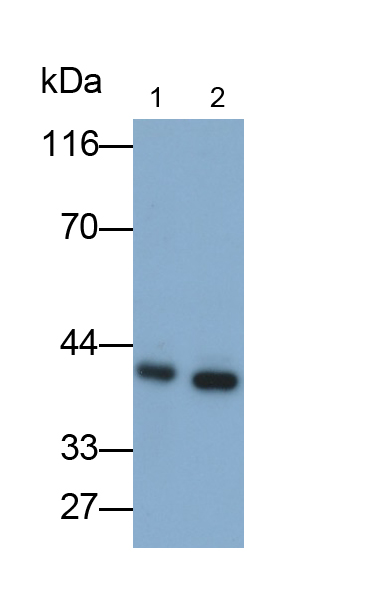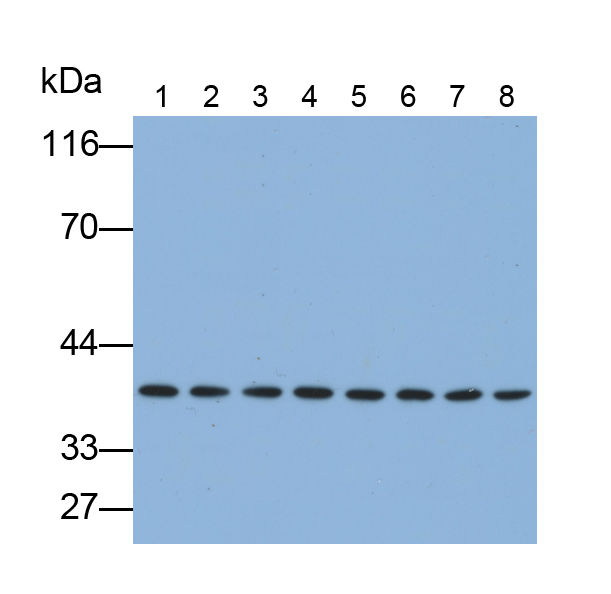Anti-Extracellular Signal Regulated Kinase 2 (ERK2) Monoclonal Antibody 

MAPK1; P38; P40; ERK2; ERT1; MAPK2; P42MAPK; P42-MAPK; PRKM1; PRKM2; P41; P41mapk; P41-mapk; Mitogen-Activated Protein Kinase 1; Mitogen-activated protein kinase 2
Overview
Properties
- Product No.CAA930Mi22
- Organism SpeciesMus musculus (Mouse), Rattus norvegicus (Rat) Same name, Different species.
- ApplicationsWB
Research use only - Downloadn/a
- CategorySignal transductionEnzyme & KinaseTumor immunity
- PurificationProtein A + Protein G affinity chromatography
- LabelNone
- Buffer FormulationPBS, pH7.4, containing 0.02% NaN3, 50% glycerol.
- TraitsLiquid, Concentration 1mg/mL
Sign into your account
Share a new citation as an author
Upload your experimental result
Review

Contact us
Please fill in the blank.
Specifity
The antibody is a mouse monoclonal antibody raised against ERK2. It has been selected for its ability to recognize ERK2 in immunohistochemical staining and western blotting.
Usage
Western blotting: 0.2-1ug/ml;
Optimal working dilutions must be determined by end user.
Storage
Store at 4°C for frequent use. Stored at -20°C in a manual defrost freezer for two year without detectable loss of activity. Avoid repeated freeze-thaw cycles.
Stability
The thermal stability is described by the loss rate. The loss rate was determined by accelerated thermal degradation test, that is, incubate the protein at 37°C for 48h, and no obvious degradation and precipitation were observed. The loss rate is less than 5% within the expiration date under appropriate storage condition.
Organism Species More: Mus musculus (Mouse), Rattus norvegicus (Rat), Cavia (Guinea pig ), Canis familiaris; Canine (Dog), Sus scrofa; Porcine (Pig), Bos taurus; Bovine (Cattle), Capra hircus; Caprine (Goat), Chicken (Gallus)Giveaways
Increment services
-
 Antibody Labeling Customized Service
Antibody Labeling Customized Service
-
 Protein A/G Purification Column
Protein A/G Purification Column
-
 Staining Solution for Cells and Tissue
Staining Solution for Cells and Tissue
-
 Positive Control for Antibody
Positive Control for Antibody
-
 Tissue/Sections Customized Service
Tissue/Sections Customized Service
-
 Phosphorylated Antibody Customized Service
Phosphorylated Antibody Customized Service
-
 Western Blot (WB) Experiment Service
Western Blot (WB) Experiment Service
-
 Immunohistochemistry (IHC) Experiment Service
Immunohistochemistry (IHC) Experiment Service
-
 Immunocytochemistry (ICC) Experiment Service
Immunocytochemistry (ICC) Experiment Service
-
 Flow Cytometry (FCM) Experiment Service
Flow Cytometry (FCM) Experiment Service
-
 Immunoprecipitation (IP) Experiment Service
Immunoprecipitation (IP) Experiment Service
-
 Immunofluorescence (IF) Experiment Service
Immunofluorescence (IF) Experiment Service
-
 Buffer
Buffer
-
 DAB Chromogen Kit
DAB Chromogen Kit
-
 SABC Kit
SABC Kit
-
 Long-arm Biotin Labeling Kit
Long-arm Biotin Labeling Kit
-
 Real Time PCR Experimental Service
Real Time PCR Experimental Service
Citations
- Hypericum Perforatum Hydroalcoholic Extract Mitigates Motor Dysfunction and is Neuroprotective in Intrastriatal 6-Hydroxydopamine Rat Model of Parkinson’s DiseasePubmed:26119304
- Role of RhoA/MERK1/ERK1/2/iNOS signaling in ocular ischemic syndromepubmed:27538909
- Gonadotropin Stimulation Has Only a Limited Effect on the Concentration of Follicular Fluid Signalling Proteins: An Antibody Array Analysis33575317







